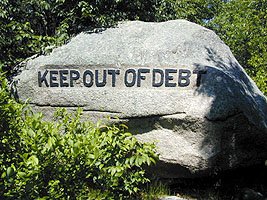I didn't really want this to become a pay off mortgage thread.

Is anyone actually listening to the OP (
nun, in case you lost track)?
I just re-read every post in this thread by
nun. Not once did I see even a hint of any expression of the 'fear of debt' that some people have. It's a financial decision for
nun, based on cash flow, and nun has already commented on the long term financial impact:
Both scenarios work on Firecalc, but refinancing gives me a better results for min max and average portfolio.
But since the line has been crossed....
 Nords
Nords captured it pretty well. And one thing I really can't understand is why anyone would label this subject as 'controversial'? There are two elements, financial and emotional:
FINANCIAL: From everything I've seen, and from what others have reported, there may be a slight positive bias towards keeping the debt - but it depends on your assumptions. I've never seen it make a big difference.
EMOTIONAL: Some people seem to be able to sleep better at night after moving a chuck of money from a diversified portfolio of investments into a single piece of RE. So they should do that if they want, and they can also sleep easier knowing that if they look back at the financial side of things, it probably won't make much difference either way. One caveat (as mentioned by others) is that you want to make sure you maintain sufficient liquidity - that can indeed become a real-life problem.
How is any of that 'controversial'?
I've never even seen(or heard?) Dave Ramsey and I wasn't trying to "talk trash" and am sure W2R wasn't either. As I said in my post, what ever works for you. I wish you the best.
aaronc879, I'm sure you didn't mean to come across as 'talking trash' towards anyone, but think about this:
When people imply that 'not paying all that interest' is a smart thing to do, or celebrate moving money from a diversified portfolio to their home, they are also implying that holding the debt must be 'not smart', and that we should be sulking (the opposite of celebrating) over our poor decision. You really can't have one w/o the other. So consider how it sounds to those of us who have run the numbers and feel comfortable with our decision. I have never implied anyone was 'stupid' for paying off their mortgage (assuming liquidity is adequate), or 'celebrated' having a mortgage. It's just a choice I made.
And when someone says
"I hate paying interest", w/o even making a passing reference to the opportunity cost of the the money used to pay down the debt, or the lack of liquidity that may result, they are (perhaps unintentionally) providing a very distorted view of the situation. And I don't see how anyone on this forum is served by one-sided views of any matter.
It would be like pointing to a managed fund, and saying it did better than an index, without acknowledging the loads or measuring it on a risk-adjusted basis. Or talking about great returns in Real Estate, w/o acknowledging that it is an active, not passive investment, and that there are risks to RE also. Those posts get brought back to reality in a second. How is this any different?
PS - I'm also re-thinking my lifelong stand on paying cash for cars. Those rates look attractive to me.
-ERD50



